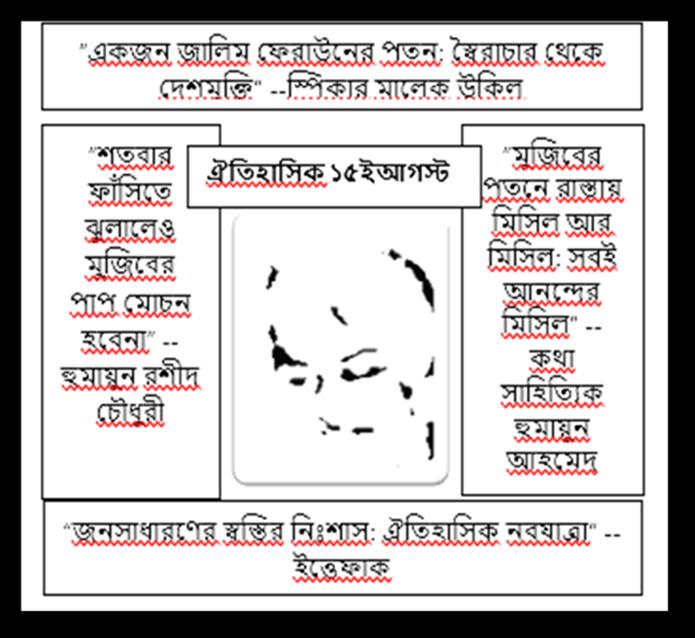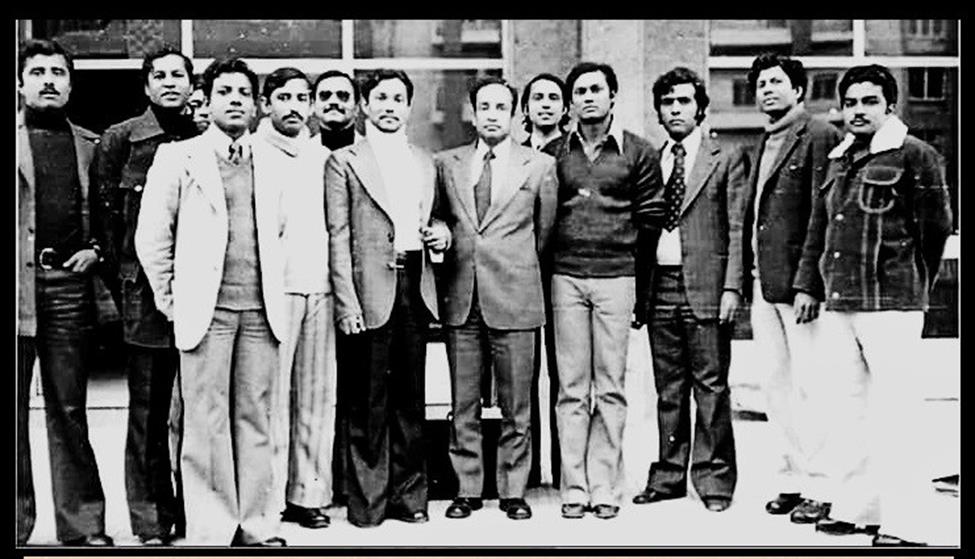
“His strolls around the corridor of power at times drew pity; he frowned at straight talk; he tried to destroy dissidents with his wrath. He loved the nation, yet he betrayed it. He had to pay with his life.”
— Enayetullah Khan, a former minister, ambassador and journalist.
Sheikh Mujibur Rahman, Bangladesh’s first authoritarian leader, fell on August 15, 1975 in a swift military action staged by a handful of young officers with about 500 soldiers. Instantly, the chiefs of all military and security forces rushed to central Dhaka’s Radio Station to publicly declare their unqualified support. The young group brought in veteran Awami leader Khandakar Mushtaq Ahmed to preside. Learning of the news, the entire nation came out to celebrate, even braving the curfew restricitons.Those who lived the time know that it was an unprecedented scene of jubilation and ecstasy by the people, only seen earlier on the Victory Day on December 16, 1971, when the country was relieved of occupation forces of the Pakistan military.
The scene was repeated, in a grander style, on August 5 this year when Sheikh Hasina resigned and fled the country in the face of a huge students-people tsunami. Under Indian tutelage, Hasina followed the footprints of her ruthless father Mujib in governing for the past two decades. Like father, democracy, human rights, freedom, fair elections were discarded. The country became a cauldron of angry sufferers that exploded on August 5. The anger fell on Mujib too. Wherever his legacy, including the huge statues erected by Hasina to immortalize her father, were smashed, broken and desecrated, a la Saddam Hossain of Iraq in 2002. “The US was behind the fall of Saddam,” I explained to an inquisitive Afghan friend. “In Bangladesh it was the people.”
After August 15, 1975, the country was put back on track. Peace and stability established and multiparty democracy returned. The country saw rapid progress and earned itself a name among the neighbors, the Muslim World and the international community.
Mourning Day
After seizing power 21 years later, helped by Indian mechanization, the daughter not only reinstated her father to be the sole architect and owner of Bangladesh but also attempted to elevate Mujib to the status of a god. Whatever the daughter did during her 20 years of combined rule, went in her father’s name, or that of someone in the Sheikh family, dead or alive. August 15 was declared a “Mourning Day” and a national holiday. The whole month of August was forced to observe as mourning month. In 2020-21, a two-year long Mujib Borso was celebrated to commemorated Mujib’s birth centenary at a cost of $75 million. The new Interim Government under Nobel laureate Professor Muhammad Yunus cancelled the Mourning Day on August12, 2024.
Judicial Murder
As Prime Minister in 1996, Hasina’s first official act was to arrange a judicial murder of the August 15 coup leaders. She orchestrated a sham trial and six available ones were sentenced to death, while intense search continued for the rest five.
Those who lived in Bangladesh during the time will bear the testimony of what an hateful authoritarian ruler Sheikh Mujib was. He fought all his life for democracy, freedom and human rights but once in power, he quickly discarded all those values to reign unalleged. More than 30,000 patriots were killed and another 62,000 were sent to jails to rot. His man-made famine in 1974 killed 1.5 million people, even though there was no dearth of relief foodgrains, which were dispensed on political expediency or sold in the black market, some even crossing the border to neighboring India. Yet, during such a crisis time, people have witnessed royal style weddings of Mujib-sons.
When things went out of control, he imposed Emergency, banning politics, suspending fundamental rights and gagging the media. In an arbitrary move, he made himself the all-powerful President, and finally established a socialist style one-party dictatorship by forming Bangladesh Krishak Sramik Awami League (BAKSAL). All doors for a constitutional change of governance were sealed. Bangladesh was all but dead.
Saviors of the Nation
In such a suffocating situation, the hapless groaning people had only to seek Divine assistance. The help came on August 15, 1975 when Mujib met his fate. The country was saved from a ruthless dictator and an imminent collapse and the coup leaders were hailed as Surja Santans (Divine Heros).
But the real heroes, the Surja Santans, of August 15 remained unsung, and Hasina grabbed some to send to the gallows before the very eyes of a dismayed nation.
Redeem the Honor
With the fall of the judicial murderer, Sheikh Hasina, the wrongs must be set right with a view to erasing this deep national stigma, as well as to acknowledge the gratitude of a beneficiary nation. Above all, the August 15 heroes must be redeemed and placed in the proper national Honor Roll.

The August 15 Leaders with AVM Tawab (Air Chief and a DCML)

